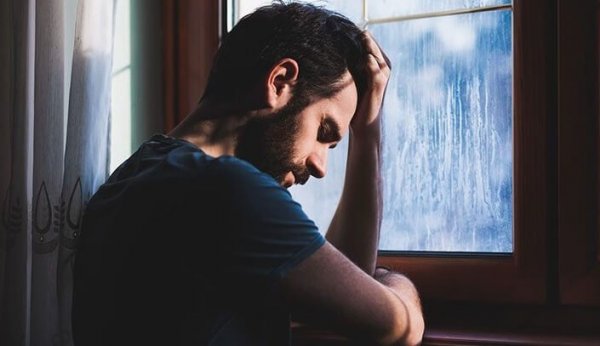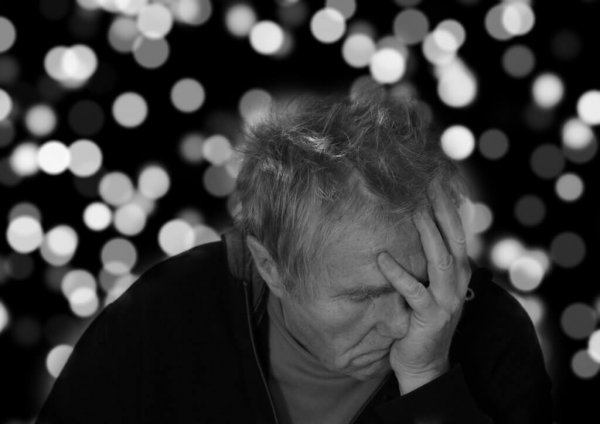The Symptoms of Depression


Written and verified by the psychologist Valeria Sabater
The symptoms of depression are as wide-ranging as they are individual to each person. But they all share one dark reality: chronic pessimism and an inability to keep up with life. It’s a completely paralyzing illness. On top of that, it doesn’t care about your age, your gender, or your social position. It’s an illness that’s also still surrounded by mystery.
They say that putting words to your pain is the first step to recovering. Saying where it hurts means making a wound visible. It means being able to diagnose a trauma or some internal problem that has specific symptoms. But when it comes to depression, that’s not so easy. People with depression have a really hard time explaining exactly where they hurt.
“Depression takes away your hope, and without hope there’s no life.”
-Luis Rojas Marcos-
Why? Whether we’re talking about dysthymia, a seasonal disorder, major depression, or even bipolar disorder, people say “everything” hurts. Their body, their thoughts, and their life all weigh on them. Everything stings and everything wears them out. With this whole kaleidoscope of issues, it feels impossible to clearly explain what’s wrong.
Maybe that’s why it’s misdiagnosed so much. It’s quite common for primary care doctors to just treat specific conditions without ever thinking that depression might be lying behind them. It’s also really common for people (especially men) to be skeptical of asking for help. They find refuge in apathy and say that it’s just stress. They’re just going through a rough patch, that’s all.
Detecting depression early can make treatment more effective. That’s why it’s so important to learn to recognize the symptoms of depression, whether it’s for yourself or people close to you.

Symptoms of depression you should know
Depression manifests a lot of different ways. There are a lot of depressive disorders, and they might be associated with other psychological factors that need to be diagnosed too. Everyone experiences the illness in their own way. This also means that treatment should be personalized.
What we’re talking about is a condition that will invade every part of your body. It affects the immune system, digestive system, sleep cycles, metabolism, cognitive processes, etc.
Psychiatrists will also remind us that this personal situation, this condition, isn’t a sign of weakness. Depression is not something you choose or bring on yourself. It’s also not like a broken bone that you can just heal with a bit of rest and recovery. It’s a very complex, tricky situation that involves some of the symptoms we’re going to talk about now.
Behavioral symptoms
Some of the most common symptoms of depression are behavioral. Let’s look at them in more detail.
- Activities that you used to enjoy and used to be motivating don’t interest you anymore.
- Trouble dealing with work-related responsibilities.
- Things you used to do quickly will take you longer now. Even just thinking about those things can wear you out.
- Lack of interest in socializing.
- Hypoactivity or hyperactivity. This part is important: we often associate depression with a lack of energy and low activity. But the exact opposite can also happen. There are some people who can’t stop. They have to constantly keep themselves busy so they won’t think.
Emotional symptoms
- Bad mood.
- A constant feeling of frustration.
- A lack of confidence.
- Dark thoughts and a lack of hope for the future.
- Constant brooding: the kind of thoughts that never stop. Over-analyzing things and becoming obsessive.
- Feelings of disappointment.
- The feeling that no one understands them.
- Permanent sadness.
- Constant irritation and anger.

Cognitive symptoms
- Trouble concentrating.
- Memory loss.
- Mental fog (feeling disconnected from reality).
- Erratic thoughts.
Physical symptoms
One area where the symptoms of depression cause problems most of all is physically. These are the symptoms that lead people to go to their primary care doctor. That’s when the doctor needs to be able to see beyond the symptoms. If they do, they might see that there’s depression underneath it all.
- Headaches.
- Muscle pain and cramps.
- Intestinal problems.
- Weight loss or weight gain.
- Hair loss.
- Trouble sleeping.
- Fatigue.
- Skin problems.
- A weak immune system.
Suicidal thoughts
One of the symptoms of depression that deserves the most attention are suicidal thoughts. They start off as random, occasional thoughts. But sometimes they end up becoming permanent and lead to an actual first attempt at suicide. That’s why it’s so important that you look out for this kind of internal dialogue:
- “If I just disappeared that would be okay.”
- “Hopefully when I go to sleep I won’t wake up again.”
- “Everyone would be better off without me.”
- “No one would even notice if I were gone.”
Symptoms of depression in children, teenagers, and the elderly
Now is a good time to point out again that the symptoms of depression vary a lot. A person’s age also plays a part.

Depression in children
- Loss of interest in playing.
- Nightmares and trouble sleeping.
- Lack of appetite.
- Refusing to go to school.
- Inhibited or agitated psychomotor activity.
- Drawings about negative or aggressive things.
- Self-harm behavior.
Depression in teenagers
- Irritability.
- Mood swings.
- Low self-esteem.
- A need to be alone.
- Self-harm behavior.
- Fatigue.
- Constant sickness: fevers, colds, nausea, vomiting…
- Poor school performance.
- Isolation and a refusal to socialize.
Depression in the elderly
- Bad mood.
- Lack of appetite.
- Inactivity and fatigue.
- Digestive problems.
- Drowsiness.
- Memory loss.

As you’ve seen, while the symptoms of depression do vary, there are still a lot of common ones. It’s an exhausting spiral of pessimism and a lack of energy. But there’s also one more thing you can’t forget about. If you dwell on what depression does to you and what it takes away, you’ll feel like you have even less control.
You have to change your outlook and push forward. Even if you feel like you’re wandering in the dark with this illness, always remember that it can be treated. You can get control of it, take away its power, and leave it behind you. You just have to take one step, the bravest of them all: to ask for help and make a commitment to yourself.
The symptoms of depression are as wide-ranging as they are individual to each person. But they all share one dark reality: chronic pessimism and an inability to keep up with life. It’s a completely paralyzing illness. On top of that, it doesn’t care about your age, your gender, or your social position. It’s an illness that’s also still surrounded by mystery.
They say that putting words to your pain is the first step to recovering. Saying where it hurts means making a wound visible. It means being able to diagnose a trauma or some internal problem that has specific symptoms. But when it comes to depression, that’s not so easy. People with depression have a really hard time explaining exactly where they hurt.
“Depression takes away your hope, and without hope there’s no life.”
-Luis Rojas Marcos-
Why? Whether we’re talking about dysthymia, a seasonal disorder, major depression, or even bipolar disorder, people say “everything” hurts. Their body, their thoughts, and their life all weigh on them. Everything stings and everything wears them out. With this whole kaleidoscope of issues, it feels impossible to clearly explain what’s wrong.
Maybe that’s why it’s misdiagnosed so much. It’s quite common for primary care doctors to just treat specific conditions without ever thinking that depression might be lying behind them. It’s also really common for people (especially men) to be skeptical of asking for help. They find refuge in apathy and say that it’s just stress. They’re just going through a rough patch, that’s all.
Detecting depression early can make treatment more effective. That’s why it’s so important to learn to recognize the symptoms of depression, whether it’s for yourself or people close to you.

Symptoms of depression you should know
Depression manifests a lot of different ways. There are a lot of depressive disorders, and they might be associated with other psychological factors that need to be diagnosed too. Everyone experiences the illness in their own way. This also means that treatment should be personalized.
What we’re talking about is a condition that will invade every part of your body. It affects the immune system, digestive system, sleep cycles, metabolism, cognitive processes, etc.
Psychiatrists will also remind us that this personal situation, this condition, isn’t a sign of weakness. Depression is not something you choose or bring on yourself. It’s also not like a broken bone that you can just heal with a bit of rest and recovery. It’s a very complex, tricky situation that involves some of the symptoms we’re going to talk about now.
Behavioral symptoms
Some of the most common symptoms of depression are behavioral. Let’s look at them in more detail.
- Activities that you used to enjoy and used to be motivating don’t interest you anymore.
- Trouble dealing with work-related responsibilities.
- Things you used to do quickly will take you longer now. Even just thinking about those things can wear you out.
- Lack of interest in socializing.
- Hypoactivity or hyperactivity. This part is important: we often associate depression with a lack of energy and low activity. But the exact opposite can also happen. There are some people who can’t stop. They have to constantly keep themselves busy so they won’t think.
Emotional symptoms
- Bad mood.
- A constant feeling of frustration.
- A lack of confidence.
- Dark thoughts and a lack of hope for the future.
- Constant brooding: the kind of thoughts that never stop. Over-analyzing things and becoming obsessive.
- Feelings of disappointment.
- The feeling that no one understands them.
- Permanent sadness.
- Constant irritation and anger.

Cognitive symptoms
- Trouble concentrating.
- Memory loss.
- Mental fog (feeling disconnected from reality).
- Erratic thoughts.
Physical symptoms
One area where the symptoms of depression cause problems most of all is physically. These are the symptoms that lead people to go to their primary care doctor. That’s when the doctor needs to be able to see beyond the symptoms. If they do, they might see that there’s depression underneath it all.
- Headaches.
- Muscle pain and cramps.
- Intestinal problems.
- Weight loss or weight gain.
- Hair loss.
- Trouble sleeping.
- Fatigue.
- Skin problems.
- A weak immune system.
Suicidal thoughts
One of the symptoms of depression that deserves the most attention are suicidal thoughts. They start off as random, occasional thoughts. But sometimes they end up becoming permanent and lead to an actual first attempt at suicide. That’s why it’s so important that you look out for this kind of internal dialogue:
- “If I just disappeared that would be okay.”
- “Hopefully when I go to sleep I won’t wake up again.”
- “Everyone would be better off without me.”
- “No one would even notice if I were gone.”
Symptoms of depression in children, teenagers, and the elderly
Now is a good time to point out again that the symptoms of depression vary a lot. A person’s age also plays a part.

Depression in children
- Loss of interest in playing.
- Nightmares and trouble sleeping.
- Lack of appetite.
- Refusing to go to school.
- Inhibited or agitated psychomotor activity.
- Drawings about negative or aggressive things.
- Self-harm behavior.
Depression in teenagers
- Irritability.
- Mood swings.
- Low self-esteem.
- A need to be alone.
- Self-harm behavior.
- Fatigue.
- Constant sickness: fevers, colds, nausea, vomiting…
- Poor school performance.
- Isolation and a refusal to socialize.
Depression in the elderly
- Bad mood.
- Lack of appetite.
- Inactivity and fatigue.
- Digestive problems.
- Drowsiness.
- Memory loss.

As you’ve seen, while the symptoms of depression do vary, there are still a lot of common ones. It’s an exhausting spiral of pessimism and a lack of energy. But there’s also one more thing you can’t forget about. If you dwell on what depression does to you and what it takes away, you’ll feel like you have even less control.
You have to change your outlook and push forward. Even if you feel like you’re wandering in the dark with this illness, always remember that it can be treated. You can get control of it, take away its power, and leave it behind you. You just have to take one step, the bravest of them all: to ask for help and make a commitment to yourself.
This text is provided for informational purposes only and does not replace consultation with a professional. If in doubt, consult your specialist.







